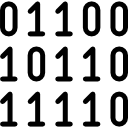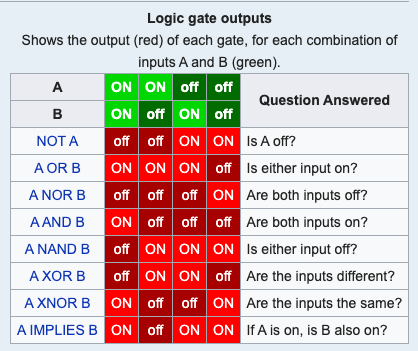Boolean operators: Difference between revisions
Mr. MacKenty (talk | contribs) |
Mr. MacKenty (talk | contribs) |
||
| (5 intermediate revisions by the same user not shown) | |||
| Line 6: | Line 6: | ||
== Boolean operators == | == Boolean operators == | ||
[[File:Boolean circuits why.png]] | |||
| Line 42: | Line 18: | ||
<iframe width="560" height="315" src="https://www.youtube.com/embed/M058skV1iL0" frameborder="0" allowfullscreen></iframe> | <iframe width="560" height="315" src="https://www.youtube.com/embed/M058skV1iL0" frameborder="0" allowfullscreen></iframe> | ||
</html> | </html> | ||
== Truth Tables == | == Truth Tables == | ||
Latest revision as of 09:04, 8 October 2020
In computer science, the Boolean data type is a data type, having two values (usually denoted true and false), intended to represent the truth values of logic and Boolean algebra. It is named after George Boole, who first defined an algebraic system of logic in the mid 19th century. The Boolean data type is primarily associated with conditional statements, which allow different actions and change control flow depending on whether a programmer-specified Boolean condition evaluates to true or false. It is a special case of a more general logical data type; logic does not always have to be Boolean.[1]
Boolean operators[edit]
This is one of the better videos I've seen on boolean. Content gratefully used with permission : [2]
Truth Tables[edit]
Boolean Logic and Logic Gates[edit]
From crash course computer science comes this EXCELLENT video teaching us about boolean logic and logic gates[3]
Standards[edit]
- Define the Boolean operators: AND, OR, NOT, NAND, NOR and XOR.
- Construct truth tables using the above operators.
- Construct a logic diagram using AND, OR, NOT, NAND, NOR and XOR gates.

